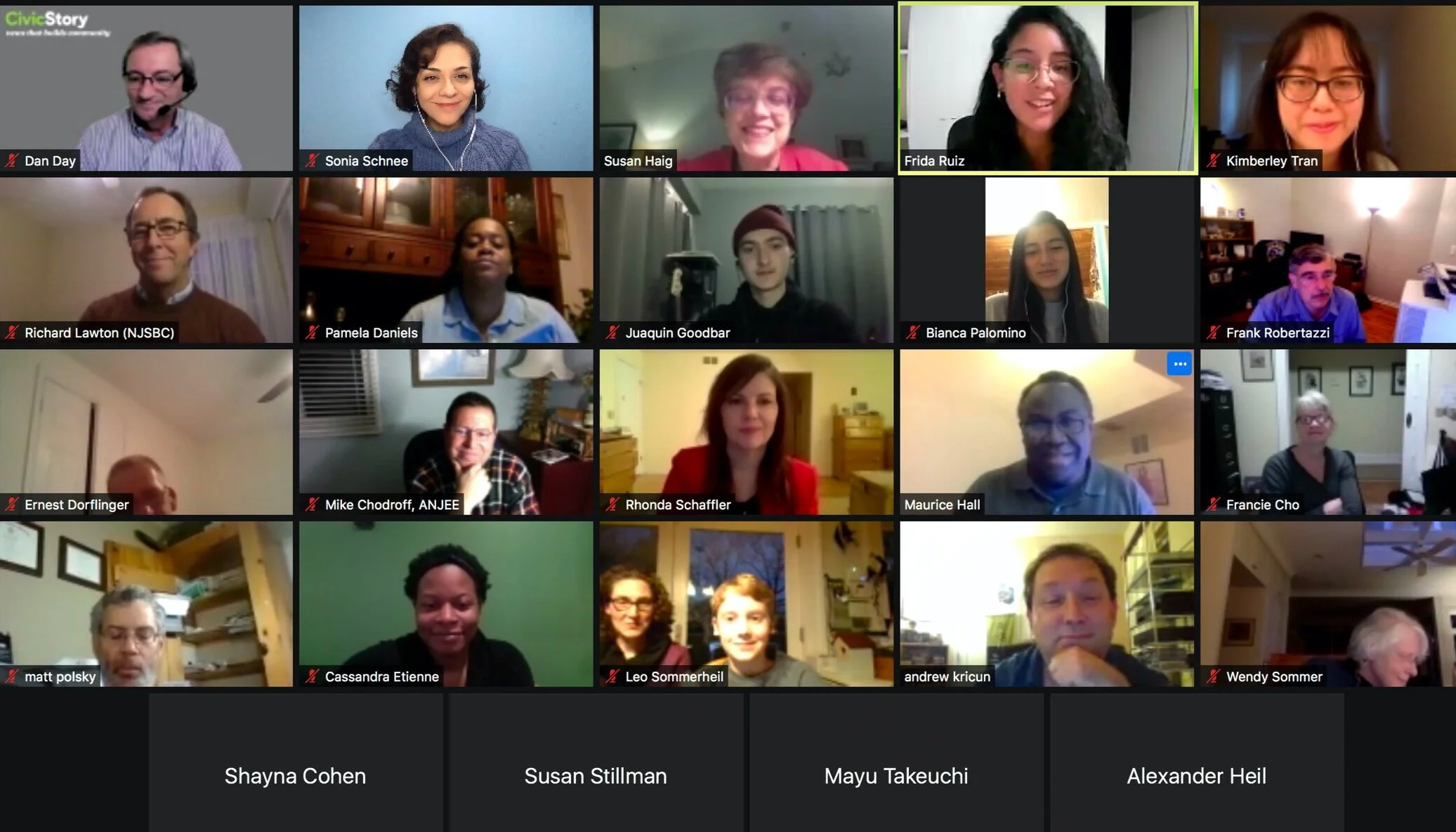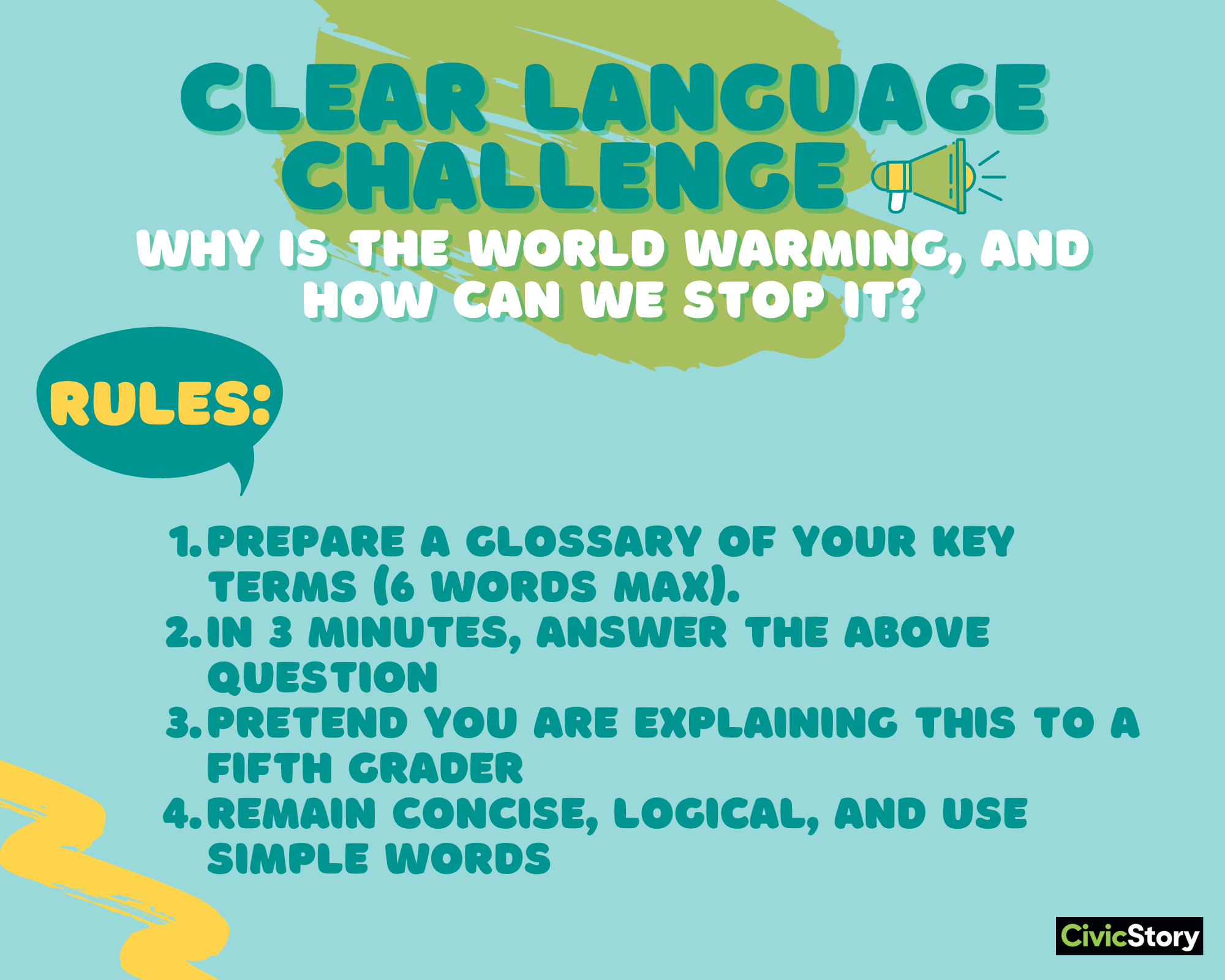Getting clear about global warming
CivicStory youth advisors Frida Ruiz and Kim Tran look back at a recent forum to promote global warming awareness.
CivicStory hosted its first "Clear Language" Forum at the close of 2020. The December 14 event drew a cross-section of students, volunteers, and CivicStory volunteers. Participants responded to the challenge: in 3-minutes, explain why the world is warming and how we can stop it.
As the student co-moderators of this forum, we were inspired to create this challenge after first trying it ourselves with CivicStory founder Susan Haig. Both of us found it challenging to concisely explain what global warming was in accessible language, free of jargon. We also struggled to capture all of the intersectional complexities of global warming—from the science behind it to its socio-cultural impacts—within a short explainer. Curious to hear other people's approach to the "Clear Language" challenge, the two of us, along with Susan, decided to host the CivicStory forum.
With the goal of clarity in mind, we asked contestants to provide a short glossary of up to 6 words before they each tried their hand at explaining. We hoped a list of key terms would ensure that all those listening were on the same page.
Forum Highlights and Takeaways
Our first contestant, Juaquin Goodbar, a sophomore at Raritan Valley Community College, explicitly named the commoditization of indigenous land and natural resources by European colonists as a cause of global warming. He also differentiated between "weather," everyday changes in factors such as temperature or precipitation, and "climate," the average changes in weather over an extended period.
Issuing a strong argument for institutional change in response to global warming, Juaquin said, "100 companies are responsible for 71% of global greenhouse gas emissions. On the flip side, the communities that have contributed the least to global warming are the ones that bear the brunt of the consequences...That's why it's so important to push for large institutional changes that include environmental justice."
Bianca Palomino, a senior at Union County Vocational Technical High School, explained how the burning of fossil fuels and deforestation have contributed to a rise in greenhouse gas emissions and a loss of biodiversity.
"Forests are cleared for the use of their timber and to make ways for buildings and homes as the global human population continues to rise. But with the eradication of forests, there are fewer trees to take in the mass production of carbon dioxide," said Bianca, reminding us of the importance of trees in producing oxygen and reducing air pollution, which improves the air we breathe.
Bianca acknowledged that while the use of renewable energy sources such as wind and solar power has increased in the U.S., more government tax breaks and funding is necessary for the growth of renewable energy versus fossil fuel production.
"The bottom line is that we contribute to the Earth's warming temperature— from how we consume food and energy in our homes to how often we travel in the cars we drive," said CivicStory editor Cassandra Etienne. She clarified that while Earth has always experienced small shifts in climate over millions of years, the Intergovernmental Panel on Climate Change in 2001 noted that temperatures are now rising faster than ever. Cassandra suggested habit-breaking changes that will reduce energy and waste and encouraged speaking to family, friends, and community members about adjusting consumption patterns to help slow down Earth's warming temperature at the individual level.
"Each of us needs to reduce our carbon footprint," said contestant Andrew Kricun, managing director with Moonshot Missions—a nonprofit that provides technical assistance to water utilities and underserved communities.
Andrew advocated for disseminating best practices across all industries to reduce carbon emission, citing plans to provide net-zero wastewater as an example. While drinking water and sewage treatment uses 5 percent of the nation's energy, Andy said companies could make a difference by eliminating the use of non-renewable energy in water treatment. Additionally, he argued that global warming is not a political issue and should instead unite everyone behind the science.
After the presentations, forum responders offered feedback. Dr. Maurice Hall, dean of the School of Arts and Communication at the College of New Jersey and Ewing, emphasized the importance of storytelling, which helps listeners make a personal connection with the facts of global warming. Pamela Daniels, a board member of CivicStory and founder of the Brickerati Group, encouraged all listeners to be conscientious of remarks that could potentially be accusatory when engaging in what can be a polarizing topic.
To close, Rhonda Schaffler, business correspondent of NJ Spotlight News, talked about the importance of using an evidence-based approach, especially since anyone can always have preconceived notions towards any given topic.
A special guest, sixth-grader Leo Sommerheil, then shared his thoughts. Being significantly younger than all of our contestants, we were excited to hear Leo's youth perspective alongside Joaquin, Bianca, Cassandra, and Andrew's explanations.
Leo—who said Swedish youth activist Greta Thunberg first inspired him to teach others about global warming—talked about his participation in a previous initiative to stop the creation of an amphitheater in an indigenous reservation. We were impressed by Leo's bravery and passion and how more and more kids from our younger generation, like him, are speaking up earlier and louder about our future.
Addressing the nuances of global warming
Towards the end of the forum, one participant in our audience cautioned against the use of simplistic explanations, pointing out that concise definitions can dismiss the complexity and the reality of global warming. They also argued that simplicity avoids the nuances in gray, ambiguous issues, especially when two ideals or systems seem to conflict at first. We agree with their points but offer that using clear language is not mutually exclusive with discussing nuance: Clear language does not necessarily mean oversimplification.
For instance, structural or social barriers such as not understanding the dominant language of one's country or not having access to Internet-accessible devices can make someone more susceptible to misinformation. As a result, we have seen many community members and peers become confused or misunderstand some of the nuanced issues about global warming. So, people need to be on the same page conceptually—or share some of the same fundamental understandings—when approaching more complex topics.
Confusion also persists when environmental terms like "climate change" are used so often to fit different definitions that they become buzz words. So while providing concise and accurate explanations is difficult, the effort to do so is necessary because most people don't understand complicated jargon.
As shown through our "Clear Language" forum, terms that have less straightforward meanings can be interpreted by individuals in many different ways: To one person, "global warming" could mean unprecedented rising temperatures. To another, "global warming" might mean an existential threat to their home community, which shoulders a burden of excess pollution.
Now more aware of the broad nature of the phrase "climate change"— often used in conjunction with "global warming"—we've begun to notice how frequently the terms are used by people we know, in public and the media, but without much explanation or context.
Using accessible language with the general public will allow those engaged in discussions and distributing information to communicate more effectively. We hope that this challenge and similar exercises to promote clarity around global warming will help us become more self-aware of the default terms we tend to overuse. Instead, we can try to make the possible "jargon" terms we use more precise by breaking them down into logical parts as needed. With this clarity, more people can participate in global warming discussions to a greater extent. We can become more invested in the topic at hand, which will provide the knowledge and facts needed to partake in more fruitful, in-depth conversations.
About the authors:
Frida Ruiz is a high school senior attending the Sustainable Sciences program at Union County Vocational-Technical High School. She is a founder of The Green Cause, a local environmental education initiative, and hopes to one day work at a renewable energy facility as an engineer.
Kimberley Tran is a development intern with CivicStory. She is a rising sophomore at Princeton University, originally from St. Louis, MO. Kim plans to major in Molecular Biology and is also passionate about environmental justice and fostering energy efficiency in all communities. Kim is a team leader for New Jersey Student Climate Advocates and hopes to one day go to med school and specialize in environmental health.


